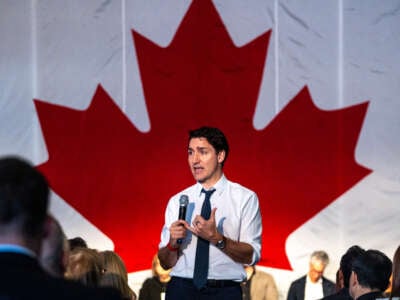Montreal, Canada — The United States has loomed large over Canada’s upcoming election, with concerns over President Donald Trump’s tariffs and annexation threats dominating much of the campaign.
But for many Canadians, another topic has also been front-of-mind in the lead-up to the vote on April 28: Israel’s war on Palestinians in the Gaza Strip.
“This is a priority issue for many Canadians,” said Dania Majid, a Palestinian community advocate and lawyer based in Toronto, in an interview with Truthout. “We are not detached from what is happening in Palestine.”
Last month, a survey commissioned by the National Council of Canadian Muslims (NCCM) found that 55 percent of Canadian voters backed a ban on weapons exports to Israel as the war in Gaza dragged on. Another 49 percent said they would support extending that ban to weapons parts and military training, as well.
A recent Canadian Muslim Public Affairs Council (CMPAC) election survey also found that 58 percent of Canadian Muslims said Canada’s policy on Palestine was their top concern. More than 86 percent of respondents also said they viewed the Canadian government’s position as “completely inadequate.”
And in mid-April, thousands of people from across Canada converged on Parliament Hill in the capital, Ottawa, to demand action from Canada’s political leaders to end Israel’s war on Gaza.
When the Canadian election campaign began in late March, Palestinians in Gaza were once again facing a deadly and relentless bombardment after Israel broke the ceasefire, and the humanitarian crisis gripping the coastal enclave was deepening by the day.
In the occupied West Bank, frequent Israeli military and settler attacks were forcing thousands of Palestinians from their homes.
In response Majid and other organizers launched a Canada-wide push called “Vote Palestine” to make Palestinian rights an issue in the race.
Despite an election race dominated by anxieties around Trump’s threats against Canada as well as housing and grocery costs, activists have forced Palestine into the conversation.
The goal, Majid explained, has been to show Canada’s politicians that the situation in Palestine has gone beyond foreign policy to become a domestic political issue — and something that they cannot ignore.
“We want to ask those who are seeking to be our representatives on Parliament Hill what their positions are on Palestine and what they are going to do about supporting Palestinian human rights,” she told Truthout.
“With the genocide still raging [in Gaza], with the ethnic cleansing, land theft and oppression in the West Bank — this is the context this federal election is happening in.”
Canada’s Stance
The focus on Palestine during the federal election campaign comes as Canada has seen months of protests, sit-ins, and other actions spurred by anger over the Israeli bombardment of Gaza and the Canadian government’s stance.
Canada has long presented itself as taking a middle ground, backing a two-state solution and stressing the need to uphold international law.
But Palestinian rights advocates and other experts say that, in practice, Canada has largely sided with Israel, a country with which it maintains strong economic and diplomatic ties.
As the war in Gaza raged, the Canadian government faced calls to act.
A growing chorus of Canadians — from Palestinian, Arab and Muslim community members to health care workers, progressive activists and others — urged the government to pressure Israel to end its military offensive.
Near-weekly protests were held in major Canadian cities, raising awareness about the situation in Gaza. Meanwhile, similar to scenes in the U.S., students at Montreal’s McGill University and the University of Toronto erected protest encampments last year to end what they said was their schools’ complicity in Israel’s war.
Pro-Israel lobby groups and lawmakers urged university administrators to crack down, raising questions about freedom of speech and academic liberties. Nonetheless, the encampments drew support from across Canada.
Protesters demanded Ottawa suspend arms shipments to the Israeli military, denounce Israeli abuses against Palestinians, support efforts at the UN to end the war and protect the rights of people in Canada protesting Israel’s policies.
Those were some of the same demands that rang out less than two weeks before Election Day as dozens of people gathered in the Montreal neighborhood of Parc-Extension to send a message to their local political candidates.
The protesters rallying in Papineau (a federal electoral district in Montreal, also known in Canada as a “riding”) on April 19 called for a two-way arms embargo against Israel and an end to the war.
“Whoever wins this election needs to respect the will of this neighborhood, and the will of this neighborhood is solidarity with Palestine,” said Amy Darwish, a member of the activist group Papineau for Palestine, which organized the demonstration.
She said Canadian politicians have long treated Palestine as something they can ignore, but that has been changing.
“[People] have been engaging actively with their candidates to make it very clear that it’s not possible to ignore this genocide [in Gaza] and that they absolutely need to take action,” Darwish told Truthout.
A Five-Point Platform
The “Vote Palestine” campaign is centered on many of the demands Palestinian rights advocates in Canada have been pushing for over the past 18 months.
The campaign has the backing of several organizations in Canada including CMPAC, World Beyond War, Independent Jewish Voices-Canada, and the Ontario branch of the Canadian Union of Public Employees (CUPE), the country’s largest union.
Organizers have urged political candidates to sign onto its five-point platform, which includes imposing a two-way arms embargo on Israel, recognizing the State of Palestine, and funding the UN agency for Palestinian refugees (UNRWA), which provides most of the aid in Gaza.
The platform also calls on Canada to end any involvement in illegal Israeli settlements and address anti-Palestinian racism and efforts to crack down on pro-Palestinian speech domestically.
As of April 21, one week before Election Day, more than 300 electoral candidates had endorsed the full “Vote Palestine” platform.
About two-thirds of the signatories are candidates with the left-wing New Democratic Party (NDP), including NDP leader Jagmeet Singh.
While the NDP has traditionally been seen as the Canadian political party that speaks out the most in defense of Palestinian rights, its record on Palestine over the years has been mixed.
Amid Israel’s war on Gaza, the party faced criticism and calls to do more to pressure the Liberal government to take concrete action; now, as the election nears, Singh has been more outspoken and pressured other party leaders to unequivocally condemn Israel’s war as a genocide.
Others from the Liberal, Green and Bloc Quebecois parties have also signed on. No Conservative Party candidates have signed the pledge.
Majid, the campaign organizer, said that, as a nonpartisan effort, “Vote Palestine” is not endorsing any parties or candidates.
“This is very much about empowering people because we hear often — and we saw this in the U.S. election — people feel very disenfranchised. They go to the polls, but their representatives never represent them,” Majid said.
“We’re trying to get people to check back in and give people the resources and the tools to go and speak to candidates … and share that Palestine is an important issue for them in this election [and] that we shouldn’t be putting the genocide to the side.”
Party Leaders Under Pressure
Indeed, despite an election race dominated by anxieties around Trump’s threats against Canada as well as housing and grocery costs, activists have forced Palestine into the conversation.
Notably, the leaders of Canada’s main political parties have been asked about their positions on Gaza during recent debates.
On April 17, frontrunner Mark Carney, who replaced former Prime Minister Justin Trudeau as the leader of the Liberal Party in March, said Canada must work to impose “maximum pressure” to reach an immediate ceasefire.
He said all captives held in Gaza must also be released and humanitarian aid must resume for Palestinians.
But Carney has drawn criticism for refusing to describe what is happening in Gaza as a “genocide” — a term scholars, human rights groups, and other experts have used to describe Israel’s military campaign and siege on the enclave.
“We know that if you can’t name genocide, you definitely won’t stop it,” the advocacy group Canadians for Justice and Peace in the Middle East said on social media of Carney’s stance.
Pro-Israel lobby groups in Canada have been outspoken during the Gaza war, defending the Israeli government’s policies and attacking lawmakers who have spoken out about human rights abuses against Palestinians.
Framing their unwavering support for Israel as part of a fight against anti-Semitism, these groups have maintained close ties to Canada’s two main political parties — the Liberals and the Conservatives — for years.
Israel, too, has enjoyed friendly relations with both Liberal and Conservative prime ministers. That includes both Trudeau and his Conservative predecessor, Stephen Harper, who was once described by Israeli Prime Minister Benjamin Netanyahu as a “great friend of Israel.” Yet amid the pressure from pro-Palestinian activists during the Gaza war, the Liberals, who have been in power since 2015, have faced angry criticism from the Israeli government for offering limited criticism of the offensive.
The government’s announcement that it was barring any Canadian-made arms from reaching Gaza, for example, drew anger among Israeli leaders.
But Canadian weapons and weapons parts are still able to reach Israel via the U.S., researchers have found.
For his part, Conservative Party leader Pierre Poilievre — whose party is trailing the Liberals after it held a double-digit lead in the polls at the start of the year — has taken a staunchly pro-Israel position.
He has promised to cut funding for UNRWA, the UN agency responsible for delivering humanitarian assistance in Gaza, which he has called a “terrorist” organization.
Poilievre also recently said a Conservative government would deport non-Canadians who take part in what he dubbed “hate marches,” referring to pro-Palestine demonstrations. He also promised a “tougher” response for Canadians who participate.
“We will bring in tougher laws to target vandalism, hate marches that break laws, violent attacks based on ethnicity and religion. Anyone who’s here on a visitor visa who carries out lawbreaking will be deported from this country,” he said on April 12.
Poilievre’s comments drew comparisons to Trump, whose administration has moved to deport students and permanent residents in the U.S. who have spoken out against Israel’s war on Gaza.
“Your treatment of Palestinians has been frankly disgusting,” Singh, the leader of the NDP, told Poilievre during one of the leadership debates.

Community United
Khaled Al-Qazzaz, executive director of the CMPAC advocacy group, said the Conservative leader’s positions are “not acceptable” for members of Canada’s Muslim community.
Recent protests in solidarity with Palestinians have been “peaceful and absent of any form of violence,” said Al-Qazzaz, stressing that Muslim Canadians have been reeling from what is happening in Gaza.
“Gaza until now is being hit, is being bombarded, is being ethnically cleansed, and the community feels that,” he told Truthout.
“The more they [candidates] neglect committing to a principled position, the more irrelevant they become on the world stage, and the less credibility they have with Canadians,” Al-Qazzaz added.
CMPAC launched the website MuslimsVote.ca to encourage political candidates to take what Al-Qazzaz described as a “principled” stance.
To date, the campaign has endorsed 47 candidates it says have expressed support for — or have a strong track record of standing up for — Palestinians. Those candidates are about evenly split between Liberal and NDP candidates.
“The new thing in this election is that this time our community is more organized,” Al-Qazzaz said of the movement.
“There are several organizations that are involved in political organizing, in articulating these policy demands, negotiating and discussing with candidates and politicians, [and] mobilizing people on the ground,” he said. “More importantly, there is more of a united front — whether on the organizational level or [in the] community — that is united by a cause.”
A “Litmus Test”
But will Canada’s Palestine policy really have an impact on the election outcome?
Al-Qazzaz said he believes Muslim voters can influence races in areas where their communities make up a large chunk of the electorate, such as ridings in the Greater Toronto Area and in British Columbia on Canada’s west coast.
The country’s Muslim population more than doubled between 2001 and 2021, the last year for which data is available, going from about 580,000 to more than 1.7 million people in that 20-year span. The population is likely even higher today.
“When the race is very close, the difference between the top two [candidates] is less than the number of registered Muslim voters in [some of] these ridings. This makes the Muslim vote an impactful decision-maker, or kingmaker,” Al-Qazzaz said.
Yet whatever happens on April 28, both Al-Qazzaz and Majid stressed that the push to get Canadian politicians to speak out on Palestine will continue beyond the election.
They each described support for Palestinian rights as a “litmus test” that demonstrates not only where a politician stands on foreign policy but on a range of domestic issues as well, including social programs, immigrant rights, and freedoms in Canada.
“If they’ve signed the pledge, then [there’s an opportunity] to ask them what’s next, how they’re going to operate to realize that pledge. If they haven’t signed the pledge, then there’s an opportunity to keep that conversation going,” Majid said.
“It doesn’t end on Election Day. The real work really starts after Election Day.”
Angry, shocked, overwhelmed? Take action: Support independent media.
We’ve borne witness to a chaotic first few months in Trump’s presidency.
Over the last months, each executive order has delivered shock and bewilderment — a core part of a strategy to make the right-wing turn feel inevitable and overwhelming. But, as organizer Sandra Avalos implored us to remember in Truthout last November, “Together, we are more powerful than Trump.”
Indeed, the Trump administration is pushing through executive orders, but — as we’ve reported at Truthout — many are in legal limbo and face court challenges from unions and civil rights groups. Efforts to quash anti-racist teaching and DEI programs are stalled by education faculty, staff, and students refusing to comply. And communities across the country are coming together to raise the alarm on ICE raids, inform neighbors of their civil rights, and protect each other in moving shows of solidarity.
It will be a long fight ahead. And as nonprofit movement media, Truthout plans to be there documenting and uplifting resistance.
As we undertake this life-sustaining work, we appeal for your support. We have 24 hours left in our fundraiser: Please, if you find value in what we do, join our community of sustainers by making a monthly or one-time gift.
Read full article at source
Stay informed about this story by subscribing to our regular Newsletter


